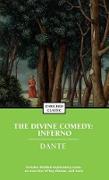ENDURING LITERATURE ILLUMINATED
BY PRACTICAL SCHOLARSHIP
The first volume of "The Divine Comedy--Dante begins his downward journey through the seven circles of Hell.
EACH ENRICHED CLASSIC EDITION INCLUDES:
- A concise introduction that gives readers important background information
- A chronology of the author's life and work
- A timeline of significant events that provides the book's historical context
- An outline of key themes and plot points to help readers form their own interpretations
- Detailed explanatory notes
- Critical analysis, including contemporary and modern perspectives on the work
- Discussion questions to promote lively classroom and book group interaction
- A list of recommended related books and films to broaden the reader's experience
Enriched Classics offer readers affordable editions of great works of literature enhanced by helpful notes and insightful commentary. The scholarship provided in Enriched Classics enables readers to appreciate, understand, and enjoy the world's finest books to their full potential.
SERIES EDITED BY CYNTHIA BRANTLEY JOHNSON


